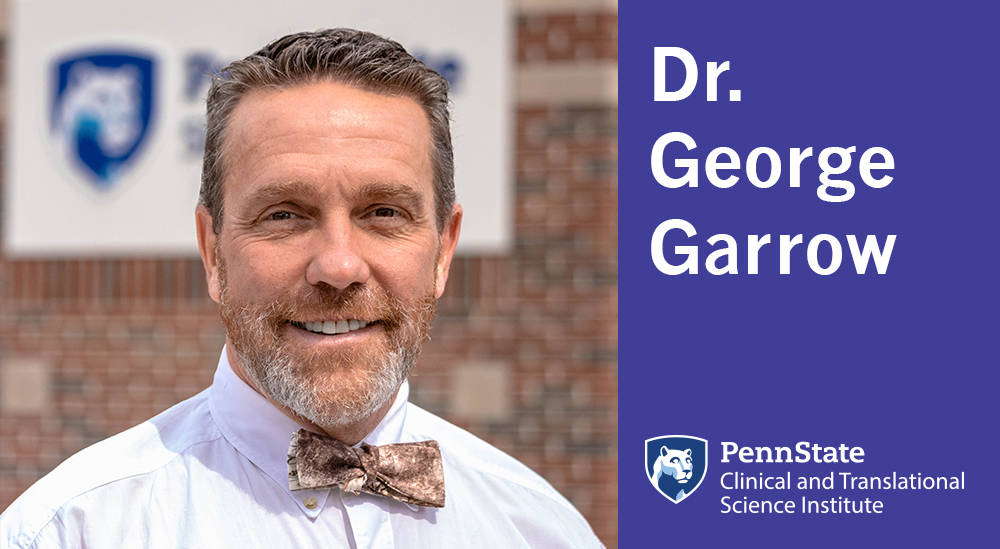Doctor’s passion for the community brings important contributions to institute board

On a recent summer day, George Garrow, MD, ate lunch at one of Sharon, Pa.’s cafés, a product of the former steel town’s revitalization efforts. A woman approached him as he sat eating.
“You probably don’t remember me,” she said, sheepishly, as she mentioned a medical issue he helped her with, and about dogs that she had talked in length about in the past.
“Of course!” he said with a smile. “How have you been?”
At least two other people approached Garrow as he ate. One he worked out with at the YMCA several times. Another was the widow of a former patient. It’s all in a day’s work for Garrow, who takes a particular interest in the communities he serves and the lives of those who live there.
It’s this passion that attracted Penn State Clinical and Translational Science Institute to invite Garrow to be a community representative on its Executive Committee. This committee is responsible for developing and meeting the institute’s strategic goals.
“The Clinical and Translational Science Award program, of which our institute is a part, emphasizes engaging communities in the research process,” said Susan McHale, PhD, co-director of the institute. “We know the importance of community representation and input throughout the institute, an effort that is led by our Community-Engaged Research Core. One of our most important populations is the rural communities and small towns of Pennsylvania. Garrow is an ideal member of our team because he works in these communities and can offer unique insights into the institute’s efforts to increase the effect of research on human health, especially concerning our focus on social and economic factors responsible for poor health in rural communities.”
Garrow, a native Pennsylvanian, is also a product of Penn State, graduating from its College of Medicine in 1985. He is board-certified in internal medicine, medical oncology and hospice/palliative care.
“I have a keen interest in population health and addressing the social factors that impact the health of our patients and the communities we serve,” Garrow said. That interest ties into his position as chief medical officer of Primary Health Network, the state’s largest Federally-Qualified Health Center, based in Sharon.
Federally-Qualified Health Centers, also known as Community Health Centers, serve those with limited healthcare access, including the uninsured, homeless and those in public housing.
“Primary Health Network provides access to high-quality care to individuals in our communities regardless of their ability to pay,” Garrow said. “I most enjoy the opportunity to work collaboratively with health care providers and organizations to drive the mission of improving access to high-quality care and identifying and addressing social determinants of health.”
The institute has been conducting a pilot program to learn what communities are affected by what social determinants of health, and then partner with these communities to find practical solutions. It is collaborating with Highmark Health to analyze a variety of data sources and is working with College of Medicine medical students to learn what challenges primary care providers and community organizations face.
It’s this type of project that Garrow would like to see more broadly – ones built on collaboration.
“I’d love to see the research and clinical initiatives of the institute become more readily available to individuals in rural and remote communities and for the lessons learned from the federally-qualified health center experience lead to novel and innovative developments within the institute,” he said. “It’s a real win-win.”
Garrow sees Penn State as a leader in the state that can create positive change.
“Penn State has long been recognized for visionary research and high-quality clinical services,” he said. “Because of the respect and trust that Pennsylvanians have for our University, I believe Penn State is best-positioned to lead efforts at improving the health and healthcare of communities across the entire state and region.”
He’s seen this first-hand. Primary Health Network partnered with its neighbor, Penn State Shenango, to open Cravings. Cravings is a social hub where community and college members can meet for food and Penn State Creamery ice cream. This space also features local art.
“Penn State Shenango has been a great partner with us,” Garrow said. “Cravings has brought a positive change to the community.”
“We have been grateful for Dr. Garrow’s contributions,” McHale said. “He has a firsthand understanding of community needs and opportunities and is motivated to make a difference. We are excited about the expertise and potential collaborations he brings to our institute.”
If you're having trouble accessing this content, or would like it in another format, please email Penn State Health Marketing & Communications.
